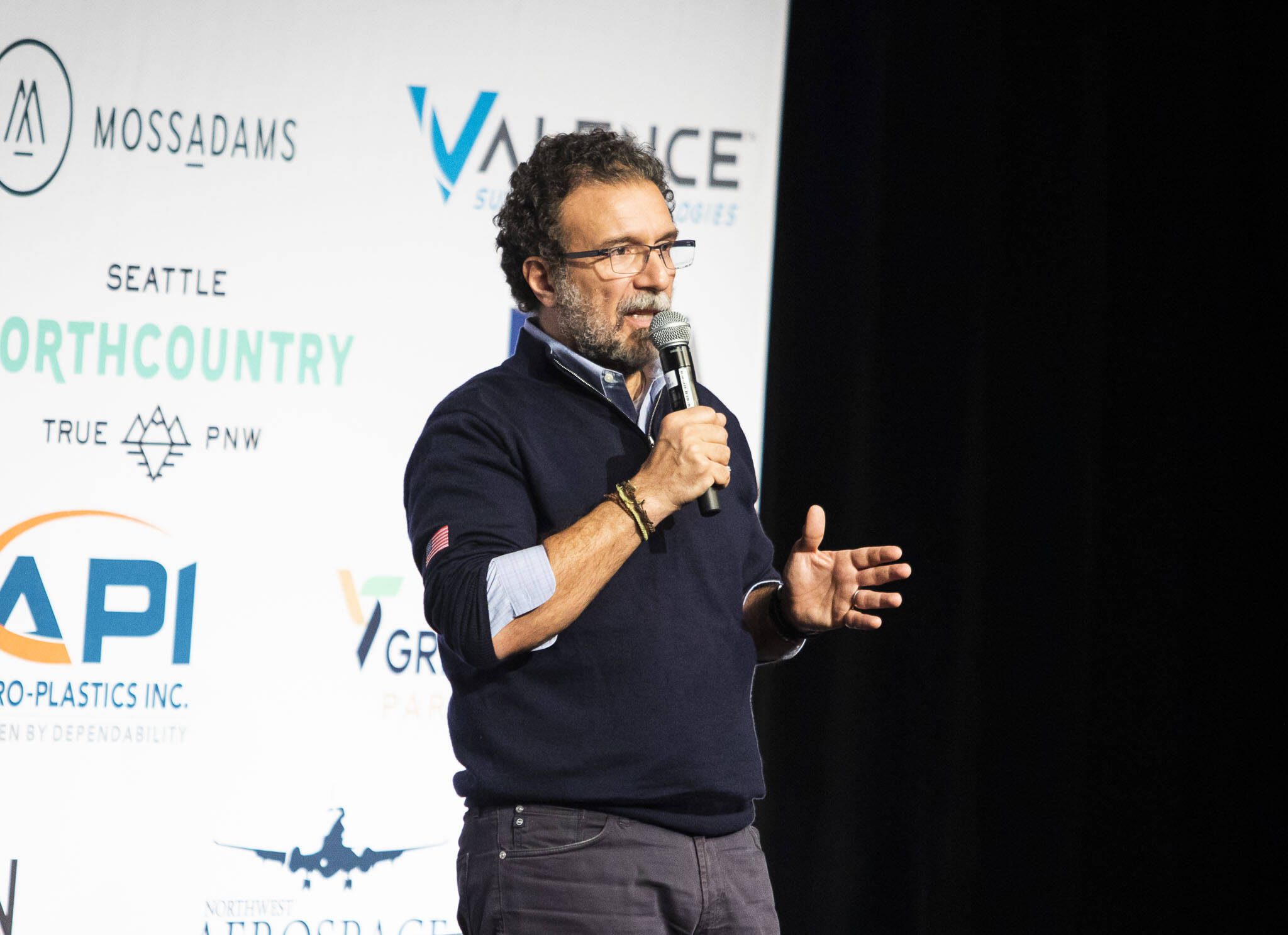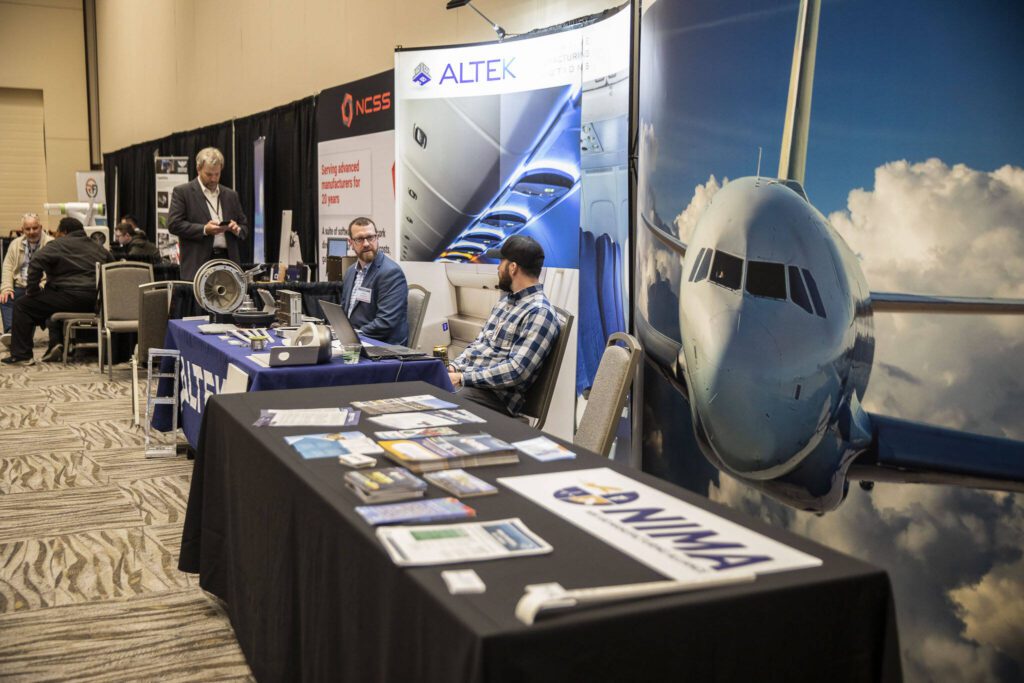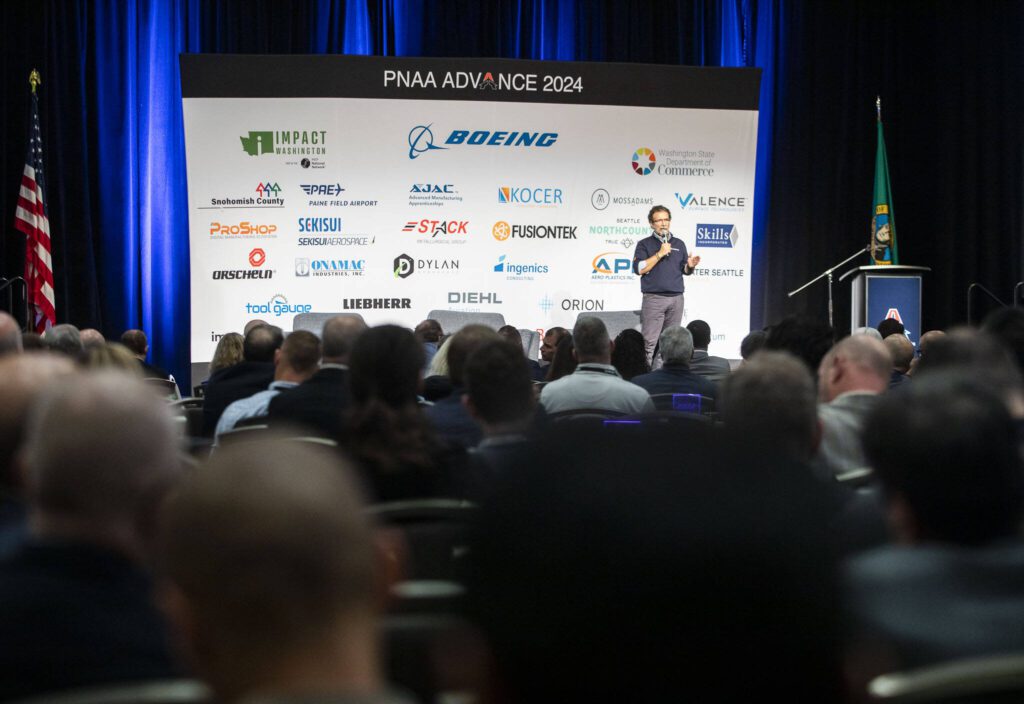LYNNWOOD — A Boeing executive is urging suppliers and employees to “speak up” and speak freely, in a bid to improve aircraft safety, following a series of high-profile midair malfunctions with terrifying consequences.
The call for greater transparency and collaboration was delivered this week to hundreds of Boeing suppliers and aerospace firms who attended the Pacific Northwest Aerospace Alliance conference in Lynnwood. The nonprofit promotes the region’s aerospace sector.
“We need more collaboration. We have to have a free-to-speak-up culture,” Ihssane Mounir, senior vice president of global supply chain for Boeing’s commercial airplanes division, told participants Wednesday.
“The safety of our products and the people who step into our products is the core value of Boeing,” Mounir said.
It’s hoped the culture shift will help prevent what happened on Jan. 5 when a door plug blew off a 737 MAX 9 with 171 passengers. No one was severely injured aboard Alaska Airlines flight 1282, though the accident has been a public relations disaster for the aviation giant. The next day, the Federal Aviation Administration temporarily grounded all 737 MAX 9s to launch a safety investigation and develop inspection guidelines.
In a preliminary report released Tuesday, federal safety regulators found four bolts designed to hold the door panel in place were missing from the two-month-old passenger jet.
“Raise your hand and tell us when you need help,” Mounir said. “Speak up … we have a commitment to help you.”
A Boeing 737 jet is made up of thousands of components, produced by a range of suppliers. More than 1,000 Boeing suppliers are located in the Pacific Northwest, including more than 200 Snohomish County-based aerospace firms, according to Economic Alliance Snohomish County.
The company has “staffed up” to assist suppliers, he said.
At the factory level, Boeing’s first-line managers and “mechanics are well trained and highly skilled,” Mounir said. “They’ve been doing this forever. They know exactly what needs to be done and we’ve got to listen to them.”
“The airplane is the ultimate teller of truth,” Mounir said. “It shows we’re all working together when we deliver quality. … We serve the airlines by delivering quality.”
In a statement Wednesday, Boeing CEO David Calhoun said: “An event like this must not happen on an airplane that leaves our factory. We simply must do better for our customers and their passengers. We are implementing a comprehensive plan to strengthen quality and the confidence of our stakeholders.”
Calhoun pledged transparency and cooperation with the National Transportation Safety Board and FAA as it proceeds with its investigations.
The latest 737 crisis follows two deadly crashes in 2018 and 2019 involving 737 MAX 8 planes. All MAX airplanes were grounded for two years while federal safety regulators investigated the crashes, which killed 346 people in all.
‘Bear with us’
Nikki Malcom, CEO and executive director of the aerospace alliance, said the annual conference offers the aerospace community the chance to come together and collectively help solve the challenges facing the industry.
The four-day event, which wrapped up Thursday, drew hundreds of aerospace suppliers, industry analysts and manufacturers, including Boeing’s rival, Airbus.
Boeing returned to this year’s conference after bowing out for two years.
In 2022, Boeing cut ties with the aerospace alliance without saying why. However, the move was widely believed to have been in response to a lawsuit filed by a former PNAA executive, alleging a toxic workplace at the trade group.
Aerospace firms that furnish parts for the 737 were particularly eager to hear what the jet maker had to say about the pace of production. It’s a key concern for firms that have tweaked operations, stocked inventory or adjusted their workforce based on production rates set by Boeing.
Boeing had planned to ramp up production of the 737 MAX this month to 42 planes a month, but with the investigation ongoing, federal regulators capped production at the current 38 planes per month. The jet maker must seek federal approval to adjust the rate.
Mounir asked suppliers to stick to the target production rate of 42 planes per month, despite the current cap.
“We understand suppliers have had to hire workers and make investments ahead of the planned ramp-up,” Mounir said. “We ask you to bear with us.”
The rate could change later this year, depending on the results of an FAA audit expected this spring.
“At the end of that audit, we’re going to see what the findings are,” Mounir said.
The newest version of the 737, the MAX, is built in Renton. However, Boeing announced last year it would begin building some 737 MAX aircraft at the company’s Paine Field assembly plant sometime in 2024.
Space became available at the Everett factory after the company consolidated production of the Boeing 787 series to South Carolina in 2021 and discontinued the Boeing 747 series in December 2022.
A 737 production line has been set up at the Everett factory but is not yet operating, according to workers at the plant.
“We will work transparently with the FAA to complete all requirements to open the 737 MAX production line in Everett,” Boeing said Thursday in an email to The Daily Herald.
‘More boots on the ground’
Doug Ackerman, vice president of supplier quality for Boeing’s commercial airplanes division, also took the stage at this week’s gathering. Both Ackerman and Mounir began their talks by apologizing for the accident that occurred aboard Alaska Airlines flight 1282.
“When an event like that happens, it is an emotional event for us,” Ackerman said. “It is something that gets our undivided attention.”
“The first thing we need to do is be humble and reflective, and think about what we’re going to do next,” Ackerman added. “It is our deepest regret for what the passengers and crew went through on that flight and ultimately what all our customers experienced as a result of that. That is something that can’t happen again and (that) we have to do better on, and we’re going to keep focusing on that.”
After their FAA-approved inspections, nearly 95% of those planes have returned to service. But scrutiny of Boeing and Spirit AeroSystems, a Wichita, Kansas, company that makes 737 fuselages, continues.
The FAA will deploy “more boots on the ground closely scrutinizing and monitoring production and manufacturing activities,” the agency’s director, Michael Whitaker, told the House Transportation and Infrastructure Committee’s Aviation Subcommittee on Tuesday.
About two dozen FAA inspectors have been sent to monitor Boeing facilities. Another half-dozen are at Spirit AeroSystems facilities, Whitaker said.
“Boeing employees are encouraged to use our FAA hotline to report any safety concerns,” Whitaker added.
The need for rigorous quality control and safety measures at Boeing is being voiced throughout the airline and travel industry.
The president of Emirates, a major Dubai-based airline, told the Financial Times on Sunday that he has seen a “progressive decline” in Boeing standards. Emirates CEO Tim Clark blamed the decline on management mistakes — including “putting financial performance over engineering excellence,” according to an Associated Press report.
“They have got to instill this safety culture which is second to none,” Clark told the Financial Times. “They’ve got to get their manufacturing processes under review so there are no corners cut, etc. I’m sure (Boeing CEO) Dave Calhoun and Stan Deal (chief of Boeing’s commercial airplanes division) are on that … this is the last chance saloon.”
The heads of Alaska Airlines and United Airlines, which have the largest fleets of 737 MAX 9s, have also angrily called Boeing out, demanding answers and evidence of improvement.
Industry analyst Richard Aboulafia has been sharply critical of Boeing’s top leaders since the first MAX crisis four years ago. Aboulafia is the managing director of AeroDynamic Advisory, a Michigan consulting firm.
Aboulafia said Boeing leadership has shifted the focus from safety and quality control to cutting costs and ramping up production rates.
To right the ship, Aboulafia recommends a clean slate.
“People say all is doomed. I think they can turn it around and do a good job, if there is a regime change,” Aboulafia told the gathering.
Chris Celtruda, CEO of Valence Surface Technologies, urged Boeing executives to ditch the office and spend more time at the factory. Valence operates an Everett facility and has locations throughout the United States.
“You can’t run a company just with a spreadsheet,” Celtruda said at a panel discussion Wednesday. “You’ve got to get out on the shop floor. Talk to the guys on the floor, they’ll tell you what’s happening.”
Janice Podsada: 425-339-3097; jpodsada@heraldnet.com;
Talk to us
> Give us your news tips.
> Send us a letter to the editor.
> More Herald contact information.



























